ReFeed: Leading the Global Collection and Certification of Waste Cooking Oil
ReFeed: Leading the Global Collection and Certification of Waste Cooking Oil
Posted December. 18, 2024 10:10,
Updated December. 18, 2024 10:11
After frying or cooking with oil, what’s the best way of disposing of the leftover waste oil? Most people don’t realize that waste cooking oil is a highly valuable resource. For example, it can be collected and refined to create biodiesel, an alternative fuel with a wide range of applications, including for aviation. Therefore, the best way to handle it is to collect waste cooking oil separately and reuse it.
However, collecting waste cooking oil cleanly is no easy task. Most households wipe it off with kitchen towels and dispose of it with general waste, making collection challenging. Even where collection bins are available, water or food residues often get mixed in during the collection process. This lowers its value, and complicates the refining process.
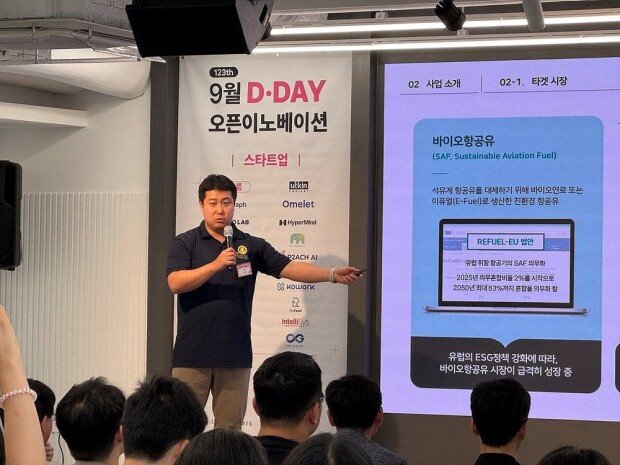 Choong-ho Lee introduces ReFeed / Source: ReFeed
Choong-ho Lee introduces ReFeed / Source: ReFeed
Recently, some new companies that specialize in collecting waste cooking oil have been emerging. Among them, the startup "ReFeed," supported by the Seoul Business Agency (SBA), has chosen a unique strategy. While others focus on collecting large quantities of waste oil, ReFeed prioritizes the certification of oil purity.
Choong-ho Lee, who founded ReFeed, previously worked at a leading petrochemical company in South Korea, planning new businesses around recycling waste cooking oil and producing bio-jet fuel. During this time, he realized that the oil collection techniques are as crucial as the oil recycling technologies. While studying carbon neutrality at Harvard Kennedy School, Choong-ho Lee recognized the potential of waste cooking oil as a promising material for securing carbon credits. This insight led to his entry into the collection and recycling market.
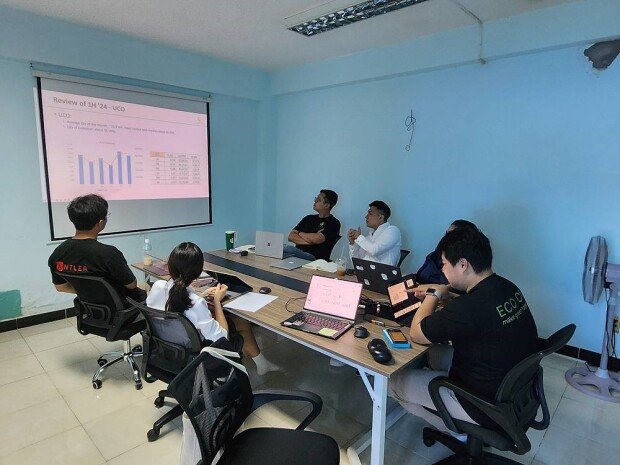 ReFeed employees in a meeting / Source: ReFeed
ReFeed employees in a meeting / Source: ReFeed
When Choong-ho Lee decided to establish it, he quickly gathered a few strong allies. First to join was Jun-bong Jeon, a feedstock trader who had worked with him at the petrochemical company for more than a decade and is now responsible for devising its monetization strategy. Jeong-hwan Yoo, with experience in media and startup incubation, leads ReFeed’s research and development. In addition, Bo-ram Kim leverages her expertise in biodiesel consulting and government relations to oversee business and service planning.
ReFeed’s first step was to study where waste cooking oil is most commonly produced, and what is most important in refining it to maximize its value. The answers were Asia and purity certification, respectively. Many Asian countries, including South Korea, Vietnam, and India, use large amounts of cooking oil. However, their systems for collecting and certifying the purity of waste cooking oil are underdeveloped.
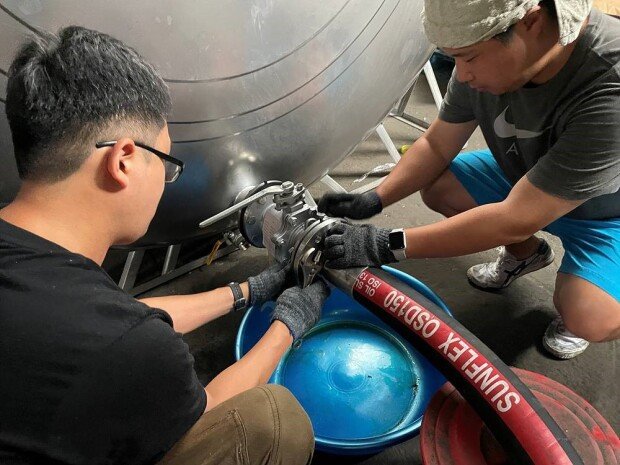 ReFeed employees conducting on-site research / Source: ReFeed
ReFeed employees conducting on-site research / Source: ReFeed
In most Asian countries, waste cooking oil is collected through vending machine-like devices. Users bring their waste cooking oil, pour it into the device, and receive payment based on the weight. However, some users inflate the weight by adding water or foreign substances to receive more payment. This results in wasted resources, while creating the need for additional monitoring efforts. Furthermore, impure waste cooking oil mixed with water or foreign substances has lower value and requires more effort to refine. While a certification system for waste cooking oil purity could prevent this, there was no proper system in place.
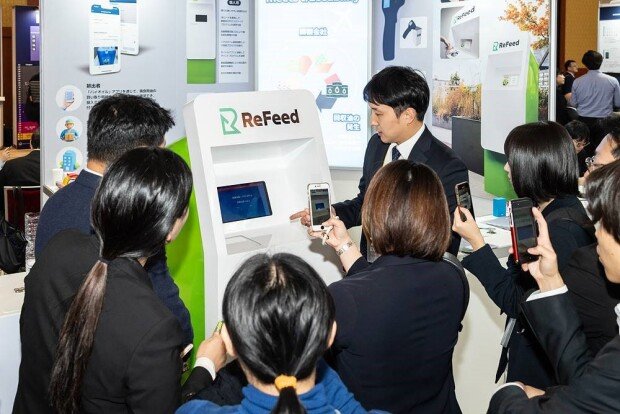 ReFeed showcases its technology at an exhibition / Source: ReFeed
ReFeed showcases its technology at an exhibition / Source: ReFeed
This gave Choong-ho Lee the idea to develop a patented technology for certifying the purity of waste cooking oil. Using a portable device, users can take a photo of the waste cooking oil, which is then analyzed through a vision-based AI to precisely measure the water content. The key advantages of this technology are its accuracy and the fact that once the photo is taken, all processes are automated, eliminating the possibility of data manipulation and increasing convenience.
After developing its collection and certification system, ReFeed conducted trials in South Korea and other Asian countries that rely heavily on cooking oil. The trials proved the effectiveness of their solution. Choong-ho Lee emphasized that ReFeed’s technology benefits consumers, businesses, and institutions alike.
 ReFeed showcases its technology at an exhibition / Source: ReFeed
ReFeed showcases its technology at an exhibition / Source: ReFeed
General consumers can now easily collect and sell their waste cooking oil, which was previously discarded, for profit. Companies can secure high-purity waste cooking oil, and refine it to produce various products, including biodiesel, or to earn carbon credits. This is particularly advantageous for oil refining companies, as they can now access superior-quality waste cooking oil. Waste cooking oil collection companies can utilize ReFeed’s technology to automatically record and manage the quality and quantity of collected oil. Additionally, the use of encryption technology at each stage of certification ensures the security of their operational data.
Considering these benefits, Choong-ho Lee strongly urges government institutions to take note of ReFeed’s technology. South Korea’s environmental and waste certification systems are among the best in the world. However, the management of waste cooking oil specifically still has room for improvement.
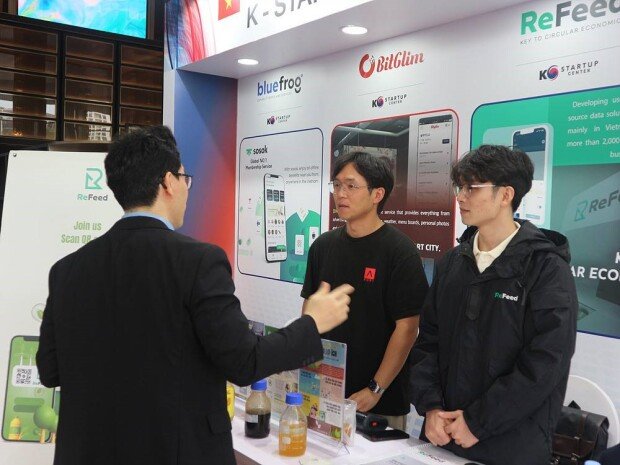 ReFeed showcases its technology at an exhibition / Source: ReFeed
ReFeed showcases its technology at an exhibition / Source: ReFeed
Currently, it is nearly impossible to track the exact amount of waste cooking oil generated by fried chicken restaurants in South Korea. Some businesses entrust the collection of their waste oil to private companies, while others discard it as household waste due to regulatory issues. As a result, more than half of the waste cooking oil goes to waste. By reforming the system to clearly manage the purity and quantity of waste cooking oil, this resource can be repurposed for other uses.
One of the best examples is aviation fuel. South Korea is the world’s largest exporter of aviation fuel. However, from 2025 onward, European countries will require at least 2% sustainable aviation fuel (SAF) in fuel exports– and this percentage will steadily rise, to more than 70% by 2050. Waste cooking oil is one of the primary materials used for producing SAF. Therefore, improving its management would enable South Korea to respond swiftly to changes in the aviation fuel market without relying on imports of waste cooking oil from abroad.
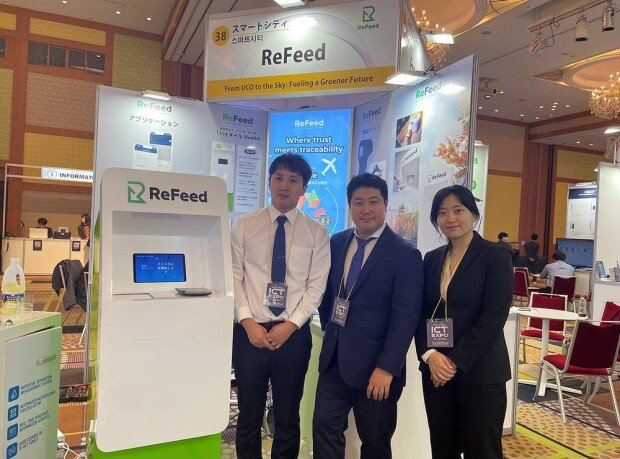 ReFeed showcases its technology at a Japanese exhibition / Source: ReFeed
ReFeed showcases its technology at a Japanese exhibition / Source: ReFeed
Choong-ho Lee plans to gradually improve South Korea’s waste cooking oil system after achieving success in international markets, and the Seoul Business Agency (SBA) is actively supporting this plan. In 2022, the SBA assisted ReFeed’s entry into Vietnam, where the company now employs 25 local staff. The SBA has also facilitated ReFeed’s expansion into India and its collaboration with government agencies overseeing food and medicine. Recently, the SBA participated in ReFeed’s pre-Series A funding round as an investor.
With this support, ReFeed has established subsidiaries in Vietnam and India and achieved meaningful revenue. Choong-ho Lee describes 2025 as a pivotal year for ReFeed. The company aims to expand its waste cooking oil collection and certification business to additional Asian countries. After accumulating business experience, ReFeed plans to enhance its certification technology and systems by consulting with governments worldwide. Currently, global standards for waste cooking oil certification are based on European and American systems. ReFeed’s ultimate challenge is to establish its certification standard as the benchmark for Asia and beyond.
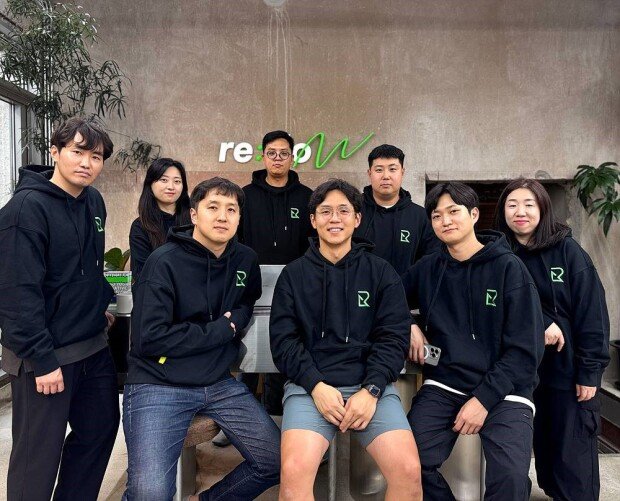 The ReFeed team / Source: ReFeed
The ReFeed team / Source: ReFeed
Choong-ho Lee concluded, “We will work to ensure that ReFeed’s waste cooking oil certification technology becomes a globally recognized solution, covering South Korea, Asia, and the international market. By combining collection, certification, and high-value product development, we aim to build a global ecosystem for waste cooking oil distribution, one step at a time.”
By Ju-kyung Cha (racingcar@itdonga.com)
However, collecting waste cooking oil cleanly is no easy task. Most households wipe it off with kitchen towels and dispose of it with general waste, making collection challenging. Even where collection bins are available, water or food residues often get mixed in during the collection process. This lowers its value, and complicates the refining process.

Recently, some new companies that specialize in collecting waste cooking oil have been emerging. Among them, the startup "ReFeed," supported by the Seoul Business Agency (SBA), has chosen a unique strategy. While others focus on collecting large quantities of waste oil, ReFeed prioritizes the certification of oil purity.
Choong-ho Lee, who founded ReFeed, previously worked at a leading petrochemical company in South Korea, planning new businesses around recycling waste cooking oil and producing bio-jet fuel. During this time, he realized that the oil collection techniques are as crucial as the oil recycling technologies. While studying carbon neutrality at Harvard Kennedy School, Choong-ho Lee recognized the potential of waste cooking oil as a promising material for securing carbon credits. This insight led to his entry into the collection and recycling market.

When Choong-ho Lee decided to establish it, he quickly gathered a few strong allies. First to join was Jun-bong Jeon, a feedstock trader who had worked with him at the petrochemical company for more than a decade and is now responsible for devising its monetization strategy. Jeong-hwan Yoo, with experience in media and startup incubation, leads ReFeed’s research and development. In addition, Bo-ram Kim leverages her expertise in biodiesel consulting and government relations to oversee business and service planning.
ReFeed’s first step was to study where waste cooking oil is most commonly produced, and what is most important in refining it to maximize its value. The answers were Asia and purity certification, respectively. Many Asian countries, including South Korea, Vietnam, and India, use large amounts of cooking oil. However, their systems for collecting and certifying the purity of waste cooking oil are underdeveloped.

In most Asian countries, waste cooking oil is collected through vending machine-like devices. Users bring their waste cooking oil, pour it into the device, and receive payment based on the weight. However, some users inflate the weight by adding water or foreign substances to receive more payment. This results in wasted resources, while creating the need for additional monitoring efforts. Furthermore, impure waste cooking oil mixed with water or foreign substances has lower value and requires more effort to refine. While a certification system for waste cooking oil purity could prevent this, there was no proper system in place.

This gave Choong-ho Lee the idea to develop a patented technology for certifying the purity of waste cooking oil. Using a portable device, users can take a photo of the waste cooking oil, which is then analyzed through a vision-based AI to precisely measure the water content. The key advantages of this technology are its accuracy and the fact that once the photo is taken, all processes are automated, eliminating the possibility of data manipulation and increasing convenience.
After developing its collection and certification system, ReFeed conducted trials in South Korea and other Asian countries that rely heavily on cooking oil. The trials proved the effectiveness of their solution. Choong-ho Lee emphasized that ReFeed’s technology benefits consumers, businesses, and institutions alike.

General consumers can now easily collect and sell their waste cooking oil, which was previously discarded, for profit. Companies can secure high-purity waste cooking oil, and refine it to produce various products, including biodiesel, or to earn carbon credits. This is particularly advantageous for oil refining companies, as they can now access superior-quality waste cooking oil. Waste cooking oil collection companies can utilize ReFeed’s technology to automatically record and manage the quality and quantity of collected oil. Additionally, the use of encryption technology at each stage of certification ensures the security of their operational data.
Considering these benefits, Choong-ho Lee strongly urges government institutions to take note of ReFeed’s technology. South Korea’s environmental and waste certification systems are among the best in the world. However, the management of waste cooking oil specifically still has room for improvement.

Currently, it is nearly impossible to track the exact amount of waste cooking oil generated by fried chicken restaurants in South Korea. Some businesses entrust the collection of their waste oil to private companies, while others discard it as household waste due to regulatory issues. As a result, more than half of the waste cooking oil goes to waste. By reforming the system to clearly manage the purity and quantity of waste cooking oil, this resource can be repurposed for other uses.
One of the best examples is aviation fuel. South Korea is the world’s largest exporter of aviation fuel. However, from 2025 onward, European countries will require at least 2% sustainable aviation fuel (SAF) in fuel exports– and this percentage will steadily rise, to more than 70% by 2050. Waste cooking oil is one of the primary materials used for producing SAF. Therefore, improving its management would enable South Korea to respond swiftly to changes in the aviation fuel market without relying on imports of waste cooking oil from abroad.

Choong-ho Lee plans to gradually improve South Korea’s waste cooking oil system after achieving success in international markets, and the Seoul Business Agency (SBA) is actively supporting this plan. In 2022, the SBA assisted ReFeed’s entry into Vietnam, where the company now employs 25 local staff. The SBA has also facilitated ReFeed’s expansion into India and its collaboration with government agencies overseeing food and medicine. Recently, the SBA participated in ReFeed’s pre-Series A funding round as an investor.
With this support, ReFeed has established subsidiaries in Vietnam and India and achieved meaningful revenue. Choong-ho Lee describes 2025 as a pivotal year for ReFeed. The company aims to expand its waste cooking oil collection and certification business to additional Asian countries. After accumulating business experience, ReFeed plans to enhance its certification technology and systems by consulting with governments worldwide. Currently, global standards for waste cooking oil certification are based on European and American systems. ReFeed’s ultimate challenge is to establish its certification standard as the benchmark for Asia and beyond.

Choong-ho Lee concluded, “We will work to ensure that ReFeed’s waste cooking oil certification technology becomes a globally recognized solution, covering South Korea, Asia, and the international market. By combining collection, certification, and high-value product development, we aim to build a global ecosystem for waste cooking oil distribution, one step at a time.”
By Ju-kyung Cha (racingcar@itdonga.com)
Headline News
- Pres. Yoon refuses impeachment documents for a week
- Debate over Lee’s participation causes friction in government consultative body
- Food and dining prices could increase en masse next year
- Foreign couple borrowed over $2 million to buy a Seoul house
- One-third of Japanese companies keep workers employed until 70







